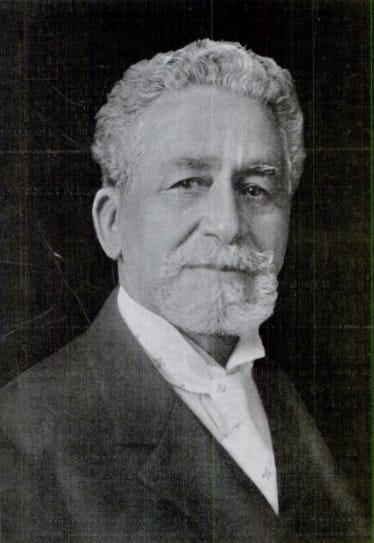Today In Black History: Dr. Richard Theodore Greener
Attorney, Educator, Diplomat, Harvard Law School Dean
Issue #773 Today In Black History, Wednesday, December 4, 2024
If you like us, REALLY like us, please click the “Like” button at the end of this post!
Your “Likes” mean a LOT to us! We appreciate your support!
Please follow me on Instagram and Bluesky.
Richard Theodore Greener was born on January 30, 1844, in Philadelphia. In 1853, his family moved to Boston, where Black children could not attend public schools. His father soon left for the California Gold Rush and never returned. At first, Greener’s mother homeschooled him, but a year later, Greener could enroll in the Broadway Grammar School in Cambridge, which already had integrated schools. He also attended meetings and lectures by anti-slavery and women’s rights activists, including Frederick Douglass.
Greener secured scholarships for the Preparatory School in Oberlin, Ohio, and Phillips Academy in Andover, Massachusetts. In 1870, Greener graduated with honors from Harvard College, the first Black person to graduate.
After Harvard, Richard Greener began his career in academia as the principal at the Institute for Colored Youth in Philadelphia. He then held a professorship at the University of South Carolina and became the first African American faculty member there.
At the University of South Carolina, Greener assisted in the departments of Latin and Greek and taught classes in International Law and the Constitution of the United States.
Greener graduated from the University of South Carolina's law school and was later admitted to practice before the Supreme Court of South Carolina. He was also admitted to the bar of the District of Columbia.
In 1875, Greener became the first African American to be elected a member of the American Philological Association, the primary academic society for classical studies in North America.
Greener also practiced law and served as a diplomat, representing the United States as a consul in Bombay, India, and Vladivostok, Russia. His legal work included a historic case arguing against racial discrimination in public conveyances in South Carolina. He also served as an American representative during the Russo-Japanese War.
Greener and his first wife, Genevieve Ida Fleet, separated after she listed the family as “white” in the Census. Greener felt that action would hinder his civil rights work. She and some of their children changed their names to “Greene” to further distance themselves from him and pass as white.
In 1902, the Chinese government awarded Greener the Order of the Double Dragon for his service in the Boxer War and assistance to Shansi famine sufferers.
Greener received two honorary Doctorates of Law from Monrovia College in Libya in 1882 and Howard University in 1907.
Phillips Academy and the University of South Carolina grant annual scholarships in Greener’s name.
The central quadrangle at Phillips Academy was named in honor of Greener in 2018.
The University of South Carolina erected a statue of Greener in front of the university library.
Richard Theodore Greener died of natural causes at age 78 in Chicago on May 2, 1922.
Today In Black History
In 1833, the Anti-Slavery Society was started in the United States.
In 1895, the South Carolina Constitutional Convention adopted a new constitution designed to eliminate Black voters.
In 1906, Alpha Phi Alpha, the first Black Greek Letter organization, was founded on the campus of Cornell University.
In 1909, the Black newspaper Amsterdam News was founded.
In 1915, the NAACP led protest demonstrations against the showing of the movie Birth of a Nation. The plot recounts the history of the Civil War and Reconstruction through the eyes and experiences of Southern whites who vehemently opposed the political and social progress made by newly freed African Americans.
In 1915, the Ku Klux Klan received a charter from the Fulton County, Georgia, Superior Court.
In 1915, the Great Migration began, with about two million Southern Blacks moving to Northern industrial centers by 1930.
In 1927, Duke Ellington opened at the Cotton Club in Harlem, New York.
In 1942, the all-Black 32nd and 33rd Women’s Auxillary Army Companies became the first contingent of WAACS assigned to a military installation in the United States during World War II.
In 1969, Black Panther leaders Fred Hampton and Mark Clark were murdered in their beds by the Chicago Police Department.
In 1969, Ebony Magazine photographer Moneta Sleet, Jr., became the first Black male and the first Black photographer to receive the Pulitzer Prize for photography.
In 2017, the U.S. Supreme Court allowed Trump’s Muslim Travel Ban for six Muslim-majority countries to come into effect.
All “We Are Speaking” posts are now free for everyone to read, and commenting on our posts is now open to everyone!
Please check out Keith’s SciFi Musings Substack for posts about fantasy, sci-fi, and Afrofuturism!
Our paid subscribers are encouraged to discuss this post in our W.A.S. Chat Community.
Join Pamela Hilliard Owens’s subscriber chat
Available in the Substack app and on the web
You are also welcome to view “We Are Speaking” in Substack Notes. You can also read other Substack publications without subscribing to them when you join Notes.
Did you know that you can listen to each “We Are Speaking” post on the Substack App? Download the app!







